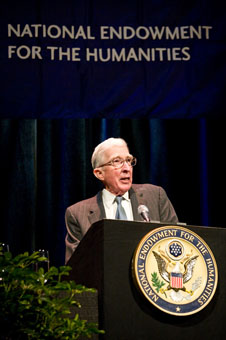Frases célebres de John Updike
John Updike Frases y Citas
Rabbit, Run
“El uno mismo esencial es inocente, y cuando prueba su propia inocencia sabe que vive para siempre.”
John Updike: Frases en inglés
“…there ought to be a law that we change identities and families every ten years or so.”
Rabbit at Rest (1990)
Fuente: Self-Consciousness : Memoirs (1989), Ch. 4
Writers on Themselves (1986)
“He skates saucily over great tracts of confessed ignorance.”
On T S Matthews, and his biography of T. S. Eliot, Great Tom (1974), in The New Yorker (25 March 1985)
“There is very little thanks in history. Dog eat dog.”
Rabbit at Rest (1990)
On a child doing homework near the family’s television set, in Roger’s Version (1986)
“His voice is hurrying, to keep up with his brain.”
Rabbit Remembered (2000)
Fuente: Self-Consciousness : Memoirs (1989), Ch. 6
On J. D. Salinger, from a review of his Franny and Zooey, in Studies in J. D. Salinger : Reviews, Essays, and Critiques of The Catcher in the Rye and other Fiction (1963) edited by Marvin Laser and Norman Fruman, p. 231; also quoted in The Christian Science Monitor (August 26, 1965) and Updike's Assorted Prose (1965).
“…"That disease he has does an awful job on you. Your lungs fill up."”
Rabbit at Rest (1990)
Fuente: Self-Consciousness : Memoirs (1989), Ch. 6
“Being naked approaches being revolutionary; going barefoot is mere populism.”
“Going Barefoot,” On the Vineyard (1980)
“She closes her eyes and wordlessly thinks of all the misery sex has caused the world…”
Rabbit at Rest (1990)
Testimony given before the Subcommittee on Select Education of the House of Representatives Committee on Education and Labor, Boston (January 30, 1978)
“The smell of good advice always makes Rabbit want to run the other way.”
Rabbit at Rest (1990)
As quoted in “When Writers Turn to Brave New Forms” by Michiko Kakutani in The New York Times (24 March 1986)
“Like Ronnie said, we're alone. All we have is family, for what it's worth.”
Rabbit Remembered (2000)
